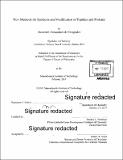| dc.contributor.advisor | Bradley L. Pentelute. | en_US |
| dc.contributor.author | Vinogradov, Alexander Alexandrovich | en_US |
| dc.contributor.other | Massachusetts Institute of Technology. Department of Chemistry. | en_US |
| dc.date.accessioned | 2017-06-06T19:25:03Z | |
| dc.date.available | 2017-06-06T19:25:03Z | |
| dc.date.copyright | 2017 | en_US |
| dc.date.issued | 2017 | en_US |
| dc.identifier.uri | http://hdl.handle.net/1721.1/109680 | |
| dc.description | Thesis: Ph. D., Massachusetts Institute of Technology, Department of Chemistry, 2017. | en_US |
| dc.description | Cataloged from PDF version of thesis. | en_US |
| dc.description | Includes bibliographical references. | en_US |
| dc.description.abstract | Chemical modification of peptides and proteins is an enabling suite of tools for tailoring the properties of these biomolecules to specific applications. A number of bio-conjugation reactions allows fine-tuning of the biological activity, proteolytic stability, and immunogenicity of peptides and proteins, as well as equipping them with completely novel functions such as cell penetration, fluorescence, unique chemical reactivity, and much more. Described herein are a number of new methods for the synthesis of modified peptides and proteins, and an approach to the discovery of such methodologies. Applications of fast-flow solid phase peptide synthesis - a technique recently developed to accelerate and improve peptide synthesis- towards the synthesis of difficult sequences and the refinement of associated protocols is described. The utility of the system is demonstrated via rapid total synthesis of barnase, a model 110-residue RNase, in the L- and D-forms. Systematic characterization of the biochemical properties of the synthesized proteins revealed that barnase is able to hydrolyze substrates of various chiralities, and that D-barnase is fully proteolytically stable. Separately, a method for the preparation and utilization of unprotected peptide isocyanates in water was developed. It was shown that easily accessible C-terminal peptide isocyanates can be conjugated to a number of strong nucleophiles in the presence of unprotected amino acid side chains for peptides and proteins of various structures. Two-component macrocyclization of peptide isocyanates with bifunctional linkers was developed as an extension of the described chemistry. The resulting cyclic peptides were shown to be more proteolytically stable and more bioactive than their linear analogs. In pursuit of generalizing the C-terminal protein modification chemistry to fully proteogenic peptides and proteins, a number of library screening approaches was developed. Liquid chromatography coupled to tandem mass spectrometry was employed to screen and reliably decode synthetic peptide libraries in a high-throughput manner. These protocols were used to discover proteogenic sequence tags reactive towards substituted hydrazine derivatives in a transpeptidation reaction. The discovered C-terminal tripeptide tag His-Gly-Cys underwent transpeptidation with a number of structurally different nucleophiles in various sequence contexts. | en_US |
| dc.description.statementofresponsibility | by Alexander Alexandrovich Vinogradov. | en_US |
| dc.format.extent | 261 pages | en_US |
| dc.language.iso | eng | en_US |
| dc.publisher | Massachusetts Institute of Technology | en_US |
| dc.rights | MIT theses are protected by copyright. They may be viewed, downloaded, or printed from this source but further reproduction or distribution in any format is prohibited without written permission. | en_US |
| dc.rights.uri | http://dspace.mit.edu/handle/1721.1/7582 | en_US |
| dc.subject | Chemistry. | en_US |
| dc.title | New methods for synthesis and modification of peptides and proteins | en_US |
| dc.type | Thesis | en_US |
| dc.description.degree | Ph. D. | en_US |
| dc.contributor.department | Massachusetts Institute of Technology. Department of Chemistry | |
| dc.identifier.oclc | 988746179 | en_US |
